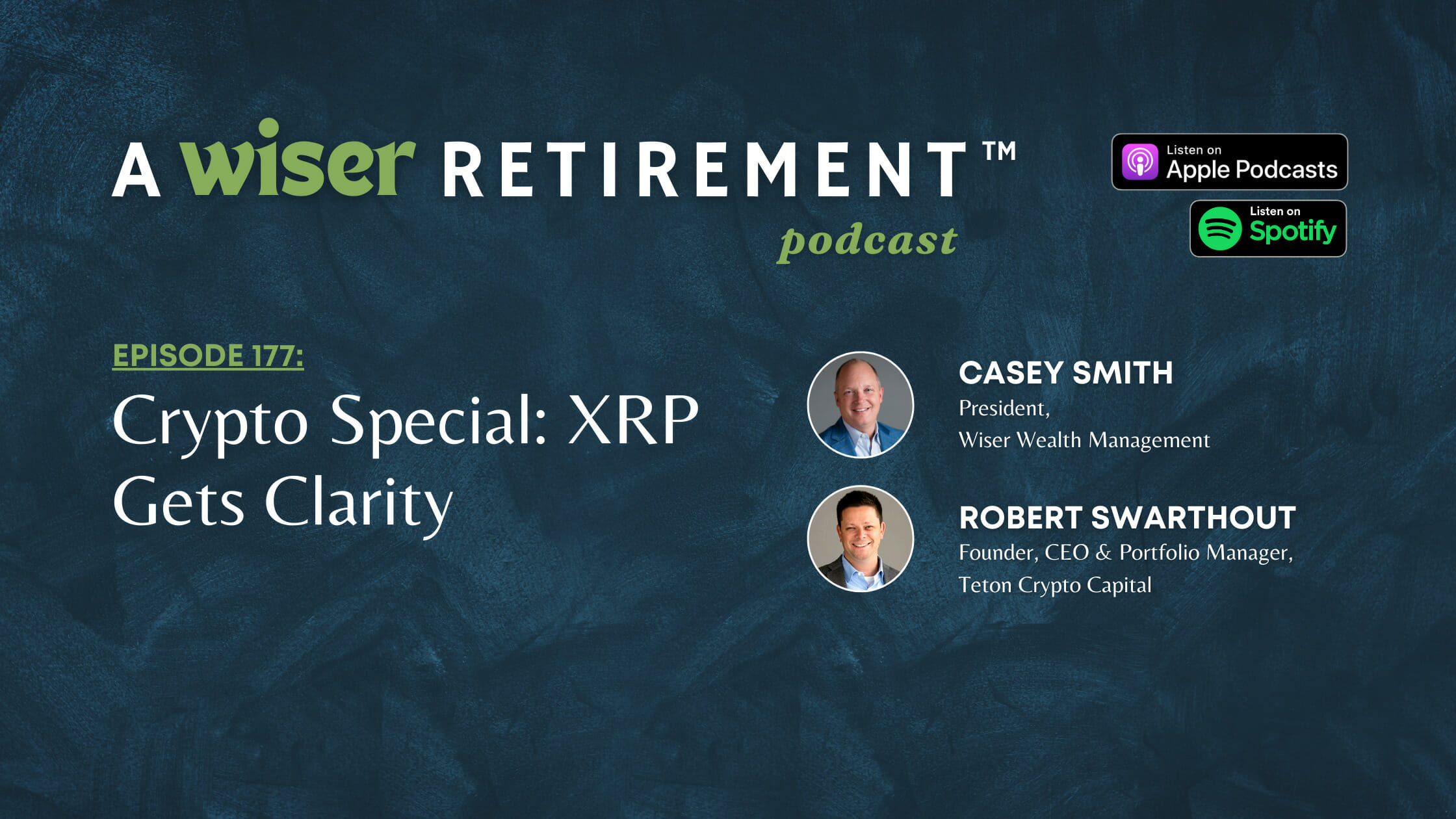
Crypto Special: XRP Gets Clarity
On this special crypto episode of A Wiser Retirement™ Podcast, Casey Smith and Robert Swarthout talk about the nature of ETFs, a possible Bitcoin spot ETF in the near future, the complexities of ETFs, and Bitcoin in the ever-evolving crypto universe. They also discuss the most current ruling in the Ripple vs SEC case, and how XRP has gotten more clarity as this case unfolds.
Listen or Watch:
SUMMARY:
Bitcoin ETF
There has been a lot of talk in the past 6 months about a Bitcoin spot ETF. In the crypto space, we currently have a futures ETF, a futures leveraged ETF, but there isn’t a spot ETF. It seems that it’s getting closer to happening since traditional players are considering sponsoring these ETFs. Opposed to what we’ve seen before, which was more based on companies that focus on crypto looking to sponsor these ETFs. Therefore, we can acknowledge a shift in perspective.
What is an ETF?
ETFs have become increasingly popular since when our firm began using them in 2004. Back then, there were only around 200 ETFs, compared with thousands of ETFs now. Since 2004, money has moved out of the mutual fund set up into ETFs. In the beginning, buying an ETF meant that you were buying the first ETF, SPY, which is a reflection of the S&P 500. This was created for active managers with the intention to create a security that they could “park” in the S&P 500, so active managers wouldn’t miss out on average returns until they had found other investments. Then from there, it kind of built up where there are futures on SPY, there are option contracts on SPY. Fasting forward to today, ETFs do not mean passive investing, there are in fact very active ETF options. There are also ETFs that don’t actually own anything, those are called ETNs (exchange-traded notes), which are less popular in the US, but very popular in Europe. In Europe, they are called ETPs for exchange-traded products.
There is a wide variety of different ETFs, and to choose the right one to invest in, you have to understand the underlying asset and how it’s structured. An important thing to ask yourself is, “Do you own the underlying asset?” “If the ETF went out of business do you get your money back right away?” On the other hand, there have been a few ETFs that have liquidated over the lifespan of ETFs and there was nothing chaotic about it, in fact, the process was very orderly. In summary, ETFs are a pricing mechanism because the market can easily trade for them.
How are ETFs structured?
Usually, an ETF gets structured through a sponsor or an issuer. For example, State Street owns SPY, so State Street would own as a sponsor for that. They’re going to work with an AP (authorized participant), which could be somebody on the trading forum, or someone who’s buying up the shares of stock. In that case, they buy the S&P 500, and they attach it to one share of SPY. As a result, the structure of ETFs is more liquid assets than stocks.
Coinbase vs. SEC Lawsuit
In light of more current events in the crypto world, Coinbase’s response to the SEC in its lawsuit claims that the SEC does not have jurisdiction over crypto on its exchange. The judge in the lawsuit asked the SEC during a hearing if they really want the court to believe that the SEC approved the S1 for Coinbase to go public. He now claims that the business is not illegal, showing some skepticism on his part.
Ripple vs. SEC Lawsuit
Early sales of XRP sold by Ripple directly to institutional investors were investment contracts. Those amounted to $728M. In this case, Ripple will pay a fine because of these sales, which proves Ripple lost this instance. Programmatic sales of XRP that Ripple made via exchanges, were not securities, which means Ripple won that. The judge did not adopt that “investment contracts require a contract”, which caused Ripple to lose on this part of the case. She does not allow the fair notice defense to proceed to trial. Ripple lost that, too. In addition, she did not directly address secondary market sales, but in her words, “most of the XRP out in the world are not securities.” Since XRP is not fungible, there is no way to tell the difference between two different XRP, so they are inherently not securities. This means a significant win for Ripple. After the trial, and as XRP gets more clarity, exchanges are starting to re-list XRP.
Download our eBook: “Buyer Beware: Why do they keep trying to sell you that annuity?”
TIMESTAMPS:
00:00 Intro
03:15 Bitcoin ETF
04:20 What is an ETF?
07:50 How are ETFs structured?
37:10 Coinbase vs. SEC Lawsuit
38:00 Ripple vs. SEC Lawsuit
LINKS:
Learn more about Casey Smith, President of Wiser Wealth Management.
Learn more about Robert Swarthout, Founder, CEO & Portfolio Manager of Teton Crypto Capital.
Share This Story, Choose Your Platform!
Wiser Wealth Management, Inc (“Wiser Wealth”) is a registered investment adviser with the U.S. Securities and Exchange Commission (SEC). As a registered investment adviser, Wiser Wealth and its employees are subject to various rules, filings, and requirements. You can visit the SEC’s website here to obtain further information on our firm or investment adviser’s registration.
Wiser Wealth’s website provides general information regarding our business along with access to additional investment related information, various financial calculators, and external / third party links. Material presented on this website is believed to be from reliable sources and is meant for informational purposes only. Wiser Wealth does not endorse or accept responsibility for the content of any third-party website and is not affiliated with any third-party website or social media page. Wiser Wealth does not expressly or implicitly adopt or endorse any of the expressions, opinions or content posted by third party websites or on social media pages. While Wiser Wealth uses reasonable efforts to obtain information from sources it believes to be reliable, we make no representation that the information or opinions contained in our publications are accurate, reliable, or complete.
To the extent that you utilize any financial calculators or links in our website, you acknowledge and understand that the information provided to you should not be construed as personal investment advice from Wiser Wealth or any of its investment professionals. Advice provided by Wiser Wealth is given only within the context of our contractual agreement with the client. Wiser Wealth does not offer legal, accounting or tax advice. Consult your own attorney, accountant, and other professionals for these services.





